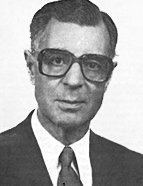

However, as time went by, his tendencies moved closer to a secular ideology of a democratic socialist nature and even to a certain scepticism appropriate to his temperament. In any ideological or professional context, he was always involved in a (sometimes healthy) controversial attitude. This is evident in many of his writings from his youth and maturity, whether in periodicals, such as the article “Toque de clarim” [Bugle call] (in Acção. Semanário da Vida Portuguesa, Lisbon, 4 September 1941), or in the book Escândalo da Verdade [Scandal of Truth] (Leiria, 1943), or in the discussion on Europe at the end of the war (O problema da Europa, Lisbon, 1945) with Abel Salazar, author of a complex book entitled A crise da Europa [Europe’s crisis] (Lisbon, 1945), or in the debates on education and the university during the Marcelism period (in this case with links to Miller Guerra, from the “ liberal wing ” , who had also been a member of the CADC in his youth) and after 25 April 1974. However, the controversies were sometimes also personal in nature. Silva Dias displayed a temperament that oscillated between a “ professorial ” attitude, which led him to some tension with his disciples, peers and other scientists – as is now clear (perhaps too clear) in the (in)confidences of Rómulo de Carvalho published posthumously ( Memórias, Lisbon, 2010, pp. 245-257) – and an openness to new academic and scientific perspectives, which earned him great respect even among those who did not always have friction-free relations with him. His career as a historian therefore came late, following a brief stint as a lawyer in his native Minho region and a period in the civil service in Lisbon. Here he held such diverse positions as Assistant to the Social Services of the Instituto Nacional de Trabalho e Previdência [ National Institute of Labour and Welfare ] from 1942 to 1946, a role that stimulated his interest in social issues and led him to join the founding group of the newspaper O Trabalhador (in which Abel Varzim wrote articles criticising the “ situation ” , which led to his exile to the parish of Minho where he was born, Cristelo, in the municipality of Barcelos and the diocese of Braga); Secretary of the Court of Criminal Enforcement (from 1949 – the year he was reinstated in the civil service – until 1953); Inspector of the Judicial Police (from 1953 to 1956); director of the Instituto de Assistência a Menores [ Institute for Assistance to Minors ] in 1956, and in the same year he was appointed Ombudsman of the Casa Pia de Lisboa.
This work is financed by national funds through FCT - Foundation for Science and Technology, I.P, in the scope of the projects UIDB/04311/2020 and UIDP/04311/2020.
